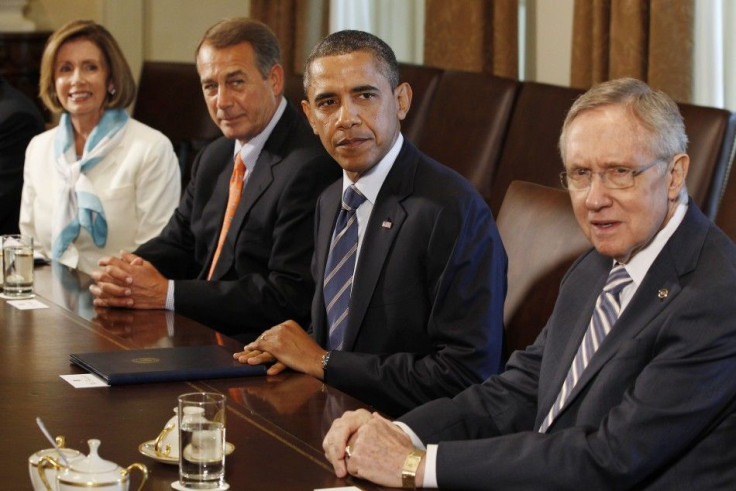Boehner, Reid No Closer to Debt Deal As Clock Ticks
Analysis

House Speaker John Boehner, R-Ohio, is not in an enviable position in the debt deal saga.
After postponing a vote on the House Republican spending reduction bill Monday night, Boehner has to decide if it's prudent to go for deeper cuts -- which the Tea Party faction of the Republican Party wants -- or to try some other way of getting a debt deal bill out of the U.S. House.
The other option may be forging a bill that would attract moderate House Democrats; few liberal Democrats are likely to vote yes on any Republican bill that has conservative footprints.
In other words, the dilemma facing Boehner and the GOP is a quintesenntial case of that old American axiom, "be careful what you wish for -- you might get it."
Throughout the 2010 Congressional campaign, and for much of the past two years, establishment House Republicans have used the Tea Party's extreme conservativism, adherance to ideology/unwillingness to compromise, and disdain for many basic government functions to whip-up right wing support for their campaigns and policy operations.
Tea Party: Two-Edged Sword
But now the Tea Party is "cashing in:" it wants establishment House Republicans to put actions behind their words.
The problem is, if a Tea Party-led, ultra-conservative, debt deal bill emerges from the House, it will probably be defeated in the Democratic-led Senate; moreover, the White House has guaranteed a veto of any such bill.
However, if Boehner can't produce a House bill, that risks, at least in theory, tossing the political momentum back to the Senate, and, because Democrats hold a majority in the upper chamber, to the Democrats led by Senate Majority Leader Harry Reid, D-Nev.
As noted, at least in theory it does. Reid's problem: he may not have the 60 votes needed to invoke cloture to end a likely Republican filibuster of his bill, expected to call for federal spending reductions of about $2.2 to $3.0 trillion, with a comparable increase in the debt ceiling.
Political/Public Policy Analysis: Therefore, with less than five days until the U.S. Government defaults on its debt, the Washington reality on Friday is that -- incredibly -- neither the Republican Party nor the Democratic Party has a viable bill -- a bill that's currently capable of attracting the bipartisan support necessary to pass both chambers.
If the issue was a land grant to Wyoming for a college that would be one thing: but the issue is enormous: the debt ceiling -- the faith and credit of the U.S. Government to pay its bills.
Understandably, U.S./global stock, bond, and currency markets are getting more nervous by the day. There is no debt deal in sight, and real disruption and lasting damage to credit markets is possible.
Therefore, based on the Thursday's non-progress, on a scale of 0 to 100 percent, the likelihood of a U.S. Government default has been increased to 60 percent on Friday morning, up 5 percentage points from Thursday night.
© Copyright IBTimes 2024. All rights reserved.





















